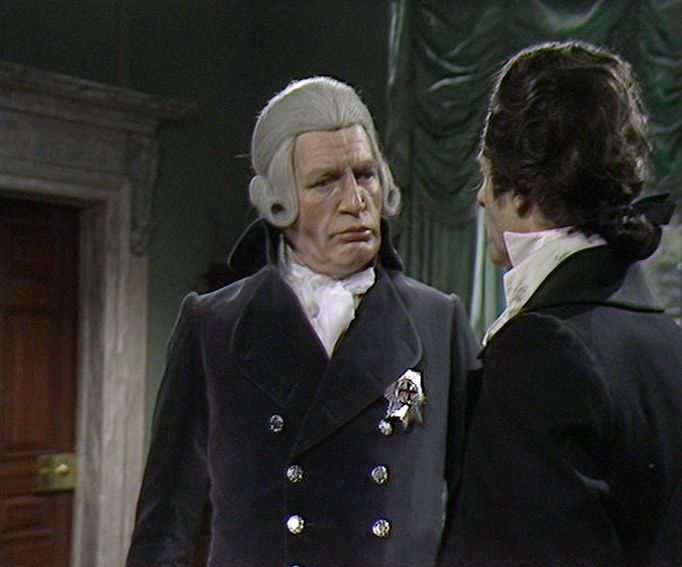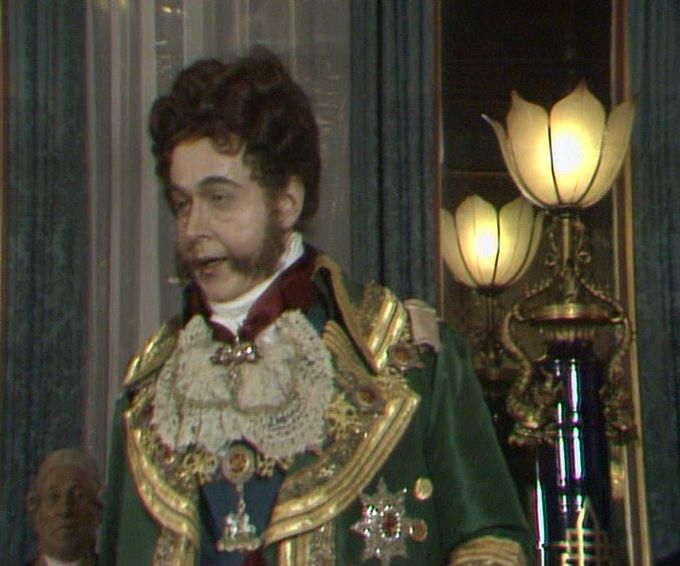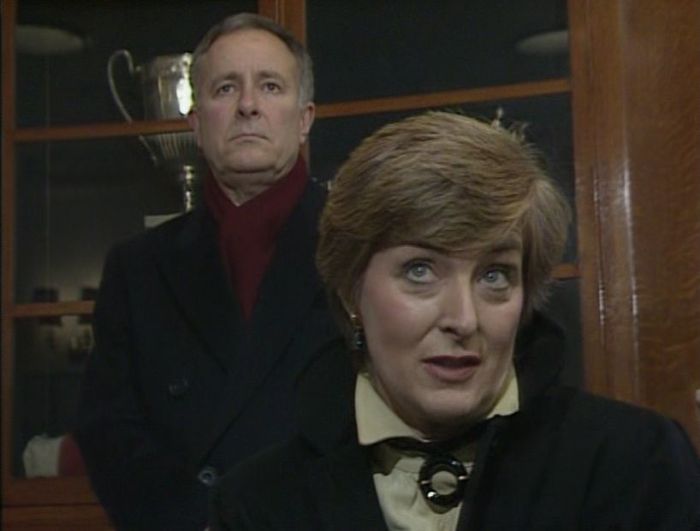
Prince Regent was an eight-part serial broadcast between September and October 1979. Peter Egan played George, Prince of Wales, a man destined to ascend the throne of England. But the madness of his father, George III (Nigel Davenport), and the strained relationship enjoyed with his wife Caroline (Diana Stabb) ensure that his succession is far from straightforward.
Unusually, multiple writers worked on the serial. Robert Muller penned five episodes with the remainder provided by Reg Gadney, Nemone Lethbridge and Ian Curteis. Carl Davis scored the music whilst Michael Simpson and Michael Hayes shared directing duties.
As might be expected, Peter Egan is supported by a highly impressive cast. Nigel Davenport, Francis White, Keith Barron, Clive Merrison, Susannah York, Diana Stabb, David Horovitch, Barbara Shelley, Caroline Blakiston, Murray Head, David Collings, Cheri Lunghi and Patsy Kensit all appear in multiple episodes whilst the likes of Geoffrey Chater, Jane Freeman, Jo Kendall and Trevor Martin make one-off appearances.
Below is a brief episode by episode review.
Episode One – Mad For Love – 4th September 1979
In his own estimate talented, passionate, sensitive, a lover of art, of sport, of freedom, of women. In his father’s opinion scandalous and irresponsible, a drunkard, a ne’er-do-well, a lecher. 1782, and George Augustus Frederick, Prince of Wales, heir to the throne of England, approaches his coming-of-age (Radio Times Listing)
Mad for Love opens with a montage of the Prince of Wales enjoying various pursuts (fencing, shooting, carriage racing) which quickly establishes his less than serious nature. That he’s easily distracted by a pretty face is also in evidence after Maria Fitzherbert (Susannah York) catches his eye. The Prince finds (much to his amazement) that he’s violently in love with her, something which Maria – after listing George’s numerous previous conquests – finds impossible to believe.
The testy relationship enjoyed between the King and the Prince of Wales is explored for the first time. The King (wonderfully portrayed by Nigel Davenport) has a low opinion of his son, but it’s puzzling that he denies the Prince the opportunity to serve in the army. By doing so he condems his son to sort of aimless life he claims to despise.

Episode Two – Put Not Your Trust in Princes – 11th September 1979
The Prince has married his beloved Maria. The ceremony is illegal and secret, hidden not only from the King but also from Fox. And the rumours and whispers of scandal, soon begin … (Radio Times listing)
Nigel Davenport continues to entertain as George III. Whether he’s at the dining table and lecturing his children about why they can’t afford certain fruit (Egan’s in full eye-rolling mode here) or displaying a lack of interest in the Bard (“oh dear god, not Shakespeare. Detest the fellow, sad stuff”) he’s great fun. But the early signs of the King’s madness casts a shadow, especially as we know what’s to come. It also has to be said that whenever George III goes “what, what, what” (which he does rather often) I can’t help but be reminded of Neddy Seagoon ….
Keith Barron, another quality player, gives a strong performance as Fox, although his heavy 5 o’clock shadow makes him look rather odd. Malcolm Terris, as a yokel politician bitterely opposed to George’s marriage, has a couple of nice scenes.
Episode Three – The Bride from Brunswick – 18th September 1979
The illegal marriage to Maria turning cold, his debts steadily increasing, the Prince begins to think the unthinkable. Why not a second, official, marriage? But who will be the bride this time? (Radio Times listing)
The Prince decides to show his gratitude to his father for settling his substantial debts by agreeing to marry whoever the King chooses. George III plumps for Princess Caroline, who is, to put it mildly, a woman of character.
James Harris, the Earl of Malmsbury (Julian Curry), is given the task of travelling to Brunswick, Germany, to arrange the match. The court at Brunswick is a delight, with Ralph Michael offering a fine comic turn as the Earl of Brunswick. The Earl likes to have endless fanfares whenever he eats, even if it means that the unfortunate players pass out after straining to maintain the notes!
Caroline is a real handful and it’s plain that she’ll shake up the Prince’s life. The meeting between Caroline and George’s most prominent mistress Lady Frances Jersey (Caroline Blakinston) is a treat but this is topped when George and Caroline first set eyes on each other. He recoils at her heavily made-up face whilst she bitterly comments that “he’s terrible fat and by no means as handsome as his portrait”. This is not going to be a marriage made in heaven ….
Episode Four – The Trouble with Women – 25th September 1979
An official wife, an unofficial wife, and a powerful and determined mistress – is it any surprise that the Prince feels besieged by women? (Radio Times listing)
Caroline bears the Prince a daughter, Charlotte, but if he’s to finally extricate himself from his debts then he’ll need to produce many more (each new child would see an increase in his allowance). George doesn’t take kindly to this thought, the fact he refers to Caroline as “that unnatural hell-hag from Brunswick” makes his postion abundantly clear.
David Collings (as Pitt) is yet another fine actor who enriches the production no end. Pitt has been opposed to George’s antics in the past, but now supports the suggestion that the Prince and Caroline should live separate lives. The Princess of Wales’ man-eating tendances (which occur off-screen) are touched upon after George tells his wife that he’s found her a nice house in Blackheath, which will be convenient, since the Royal Naval College and a home for distressed seamen are both nearby!

Episode Five – Father and Son – 9th October 1979
The King’s health has been good for several years but now there are ominous signs of a relapse into madness – convulsions, delusions, incessant talking. Is it at last time for a Regency? (Radio Times listing)
This one opens with the unusual sight of George indulging in amateur dramatics, performing an intense monologue before a select, but appreciative, audience. Although I’m sure there’s more than a touch of sychophancy in their fulsome appreciation.
George III cuts a tragic figure. He knows that his intermittent madness has returned, but the prospect of the “cure” (beatings, leeches, isolation in a darkened room) is more than he can bear. Davenport once again commands the screen.
George’s wish that his father either dies or goes properly mad is chilling.
Episode Six – God Save the King – 16th October 1979
A delicate investigation has been ordered into the alleged adultery of Princess Caroline. The Prince sees a chance for divorce from his hated wife. (Radio Times listing)
Peter Egan’s appearance at the start of this episode comes as a bit of a shock. He was slighly made up in the previous episode in order to portray an ageing and portlier George, but here it’s even more pronounced. Oddly, George III looks no different …
The investigation isn’t able to prove that Caroline has commited adultery, a verdict which rather upsets George. But even with his rather unforgiving make-up, Egan impresses as an older, wiser George. His conversation with the dying Fox is a touching one.
With George III’s madness even more of a problem, his son is finally confirmed as Regent. But now this long-cherished day has arrived, what will be the outcome?
Episode Seven – Milk and Honey – 23rd October 1979
The Regent decides that it is time for his beautiful and high-spirited daughter, Princess Charlotte, to marry. He has a candidate – but the strong-willed Princess has her own opinions on the subject. (Radio Times listing)
Princess Charlotte (Cheri Lungi) brings her new man, Captain Charles Hesse (Paul Herzberg) to meet her mother. Princess Caroline is much taken with him (they end up in bed a short while later!)
Lungi’s appearance might be fairly brief, but she’s yet another strong addition to the cast. Charlotte tells her father that she takes after him (a double-edged compliment that’s for sure). The Queen is concerned about her – Charlotte has a stutter and delights in showing people her underwear, whether they ask to see it or not. Jane Freeman, as Charlotte’s governess Lady de Clifford, has a brief but amusing cameo.
James Garbutt, as Lord Elson, has some acid lines which demonstrate that he’s not Princess Caroline’s greatest admirer. “She’s a foul-mouth, a slut and I don’t care who hears me say it.” As he says himself, there’s plenty more where that came from ….
The episode ends with the bleakest of news. It’s another blow for George, who has cast an increasingly melancholy figure as the years have progressed (a far cry from his carefree younger self).
Episode Eight – Defeat and Victory – 30th October 1979
The Prince prepares for the greatest battle of his life. His adversary is his hated wife Caroline, and he is determined to rid himself of her once and for all. (Radio Times listing)
Defeat and Victory opens with the deaths of the King and Queen. Both Nigel Davenport and Francis White have been exemplary throughout the serial and this continues right up until their final moments. With George now due to become King he is gripped by a single obsession – to ensure that Caroline is not crowned Queen and to that end she’s put on trial by the House of Lords. Leading the prosecution is Sir Robert Gifford (James Cossins). Cossins, the latest in a long line of wonderful character actors to grace the serial, seems to be enjoying himself enormously.
The episode title is an apt one, as although the Lords find Caroline not guilty, George is still able to ensure that his wife never becomes Queen.
Peter Egan, skilled at playing charming rogues, was perfect as George. But whilst he was easily able to exude George’s affable nature, Egan didn’t shy away from showing us the other side of the coin – the irresponsible man who sometimes rode roughshod over others. Capricious, charming, selfish, generous, George was all these things and more. It’s his ever-changing moods, as well the increasing melancholy which desended on him in his later years, which makes him such a fascinating character.
A co-production with Time Life Television and Polytel International , it’s plain that the budget was pretty generous since the studio sets are detailed and impressive. The serial also benefits from location recording at the Brighton Pavilion, this really helps to add an extra gloss to proceedings. A typically impressive BBC costume drama of the era, Prince Regent is a sharply scripted and well-acted serial that just oozes class. It may be something of a forgotten treasure, but it’s a treasure nonetheless and comes highly recommended. Prince Regent is released by Simply Media on the 17th of October 2016. RRP £24.99.















